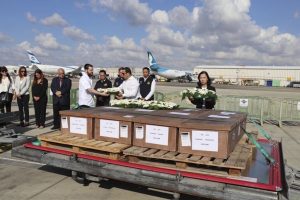Despite being a Buddhist-dominated nation far from ground zero of the raging war between Zionist Israel and Palestinian Hamas, Thailand finds itself in dangerous waters.
Prior to the Hamas-initiated attack, which ignited a new round of armed conflict, Israel hosted approximately 30,000 workers from Thailand, reflecting a strong degree of economic interdependence between the two countries. It is unsurprising then that the death toll of Thai nationals, 33 to date, is among the highest among foreign casualties. The number of Thais in Hamas’ captivity, meanwhile, is estimated by the Israeli government at 54. However, given the large concentration of Thai workers on Israel’s farms near Gaza, the actual mortality and kidnapping figures could be higher than officially reported.
The rationale behind Hamas’ targeting of Thais is quite puzzling. Thailand, with a small Muslim population of its own, has been nothing but supportive of the Palestinian cause. Notwithstanding its friendly relations with Israel, Thailand recognized Palestinian statehood in 2012 and rejected the United States’ move to endorse Jerusalem as the capital of Israel in 2017. Hamas’ prolonged brutality against Thai hostages will only erode Thailand’s sympathy toward Palestine.
But the scale of Israel’s retaliation is also a major determinant of public opinion. The explanation that Hamas merely intends to internationalize the conflict, thus complicating Israel’s responses, and Thais just happen to be easy targets, seems to indeed be the most straightforward one. However, as the famous Thai scholar Thitinan Pongsudhirak interestingly pointed out, Hamas may hold a grudge against Thai laborers who have “stolen” agricultural jobs along the Gaza Strip that supposedly belong to Palestinians.
Whatever the reasons for Hamas’ strike, it has been clear from day one that the top priorities of the Thai government are to swiftly secure the release of hostages and evacuate thousands of civilians. These tasks are extremely challenging, especially given Thailand’s limited capacity, limited presence in the Middle East, and apparent lack of robust evacuation plans for migrant workers.
Furthermore, it should have been obvious that Israel will not be able to do much to resolve the hostage crisis. Hostage exchanges between Israel and Hamas have always been a tricky business, and the current level of violence, along with the unprecedented number of hostages and Gaza’s complex terrain, have dimmed the hopes for a happy ending. Even if Israel could do more to free the captives, those from a non-Western and strategically relatively insignificant country like Thailand would almost certainly not be prioritized. A more realistic solution for Thailand would be to seek help from as many Arab intermediaries – Egypt, Qatar, Jordan, Saudi Arabia, and Iran – as soon as possible, through both formal and informal channels.
And that brings us to Prime Minister Srettha Thavisin’s early diplomatic blunder.
Almost immediately after the initial attack, the Thai leader published a post on X (formerly Twitter) that signaled a shift away from passivity, which has been the general tone of Thailand’s foreign policy for years to avoid any entanglement. “[T]he Thai Govt & I extend my deepest condolences to the Government and the people of the State of Israel,” Srettha wrote, “[w]e strongly condemn this attack, which has tragically resulted in loss of innocent lives and injury to civilians.” The post ended with Srettha expressing his hope “that the difficult situation in Israel will soon be overcome.”
Many applauded Srettha’s unequivocal condemnation of Hamas’ atrocities, yet many also thought that it came a little too soon and would make life harder for the Thai hostages. The bigger issue was the absence of “Gaza” or “Palestine” and the usual “we urge all sides to exercise restraint.” The statement could ultimately be read as Thailand choosing to side with Israel, which will not help the Srettha government win favors from Arab nations, whose pro-Palestinian sentiments are beyond question.
Perhaps what Srettha should have done instead was to distinguish between Hamas and the people of Gaza, condemning the former and expressing concern for the latter. This was the approach taken by Japanese Prime Minister Kishida Fumio. Japan, despite being a major U.S. ally, has actively sought to maintain a balanced position in the conflict.
As expected, the Thai Ministry of Foreign Affairs rushed to correct Srettha’s error, insisting that Thailand is a neutral nation that supports peaceful coexistence between Israel and Palestine.
But the damage had seemingly been done. In the early phase of the evacuation, Thai planes were mysteriously blocked from entering the airspace of a “certain Arab country” – later revealed to be Saudi Arabia – and had to take a longer route. It was only after the October 20 ASEAN-Gulf Cooperation Council summit in Riyadh, where Srettha met Saudi Crown Prince Mohammed bin Salman, that Thailand secured a green light to fly over Saudi airspace. While there were certainly other factors behind the hiccup, some observers were convinced that Srettha’s negligence of Palestine – a longstanding symbolic issue for the Saudis – might have a role to play.
The short-lived drama, which has largely flown under the radar internationally, highlights two things about the Srettha government.
First, there is a real need to improve crisis communications. The use of social media with character limits, in particular, should be avoided in order to prevent misinterpretations.
Second, there is an imbalance of talents within Srettha’s Cabinet – too many businesspersons and zero security experts – that needs to be addressed. An explicitly economic-centric foreign policy pursued by the ruling Pheu Thai Party is probably something that domestic-minded Thai voters want, yet it seems incompatible with the realities of the world, where there is less appetite for investments and more focus on traditional defense.

































